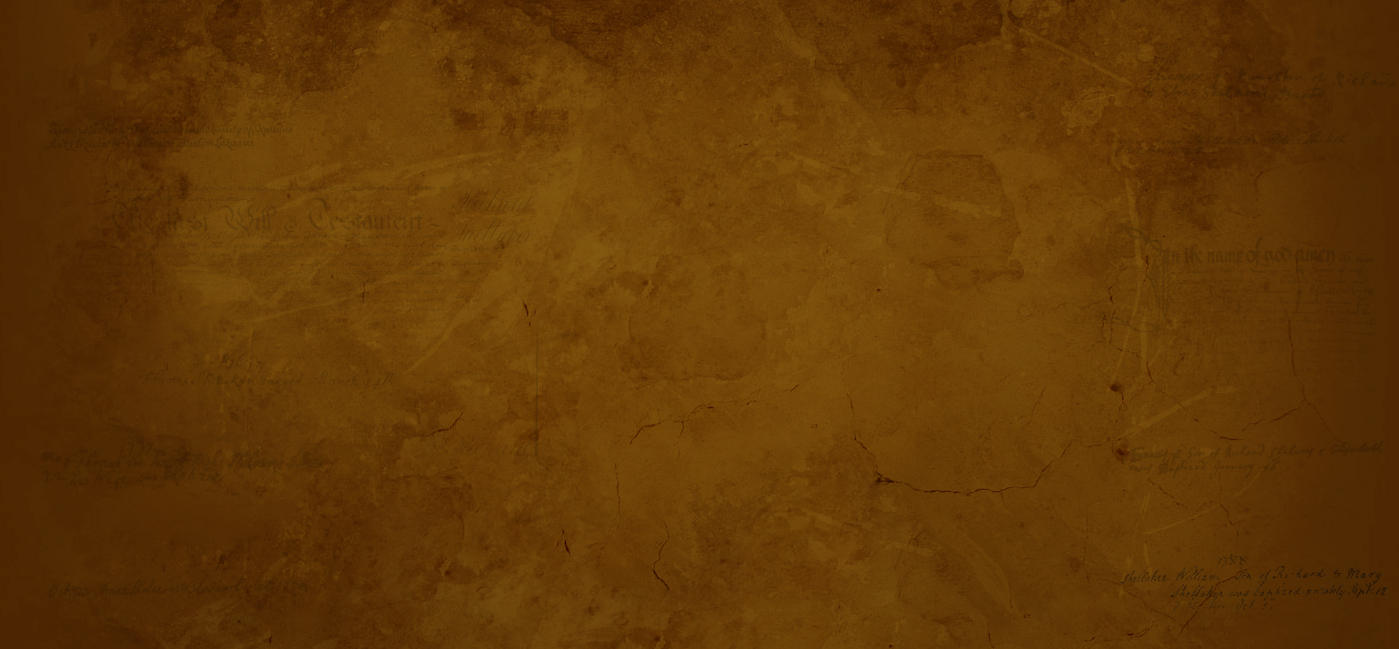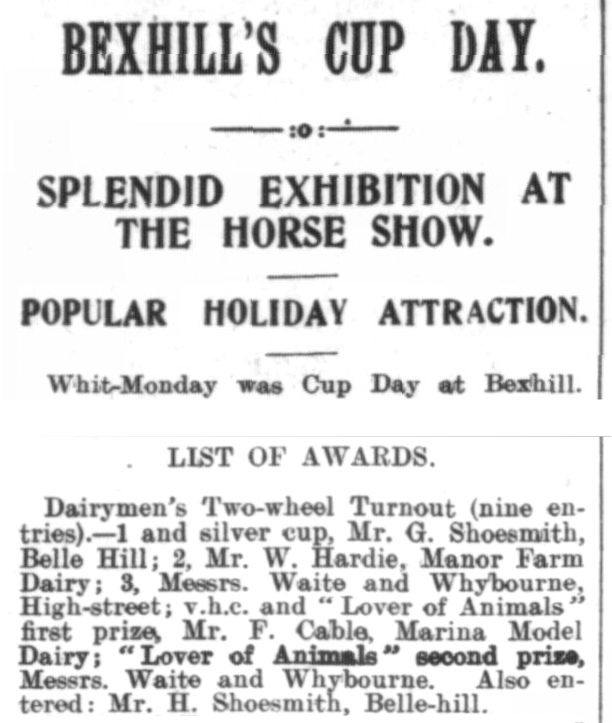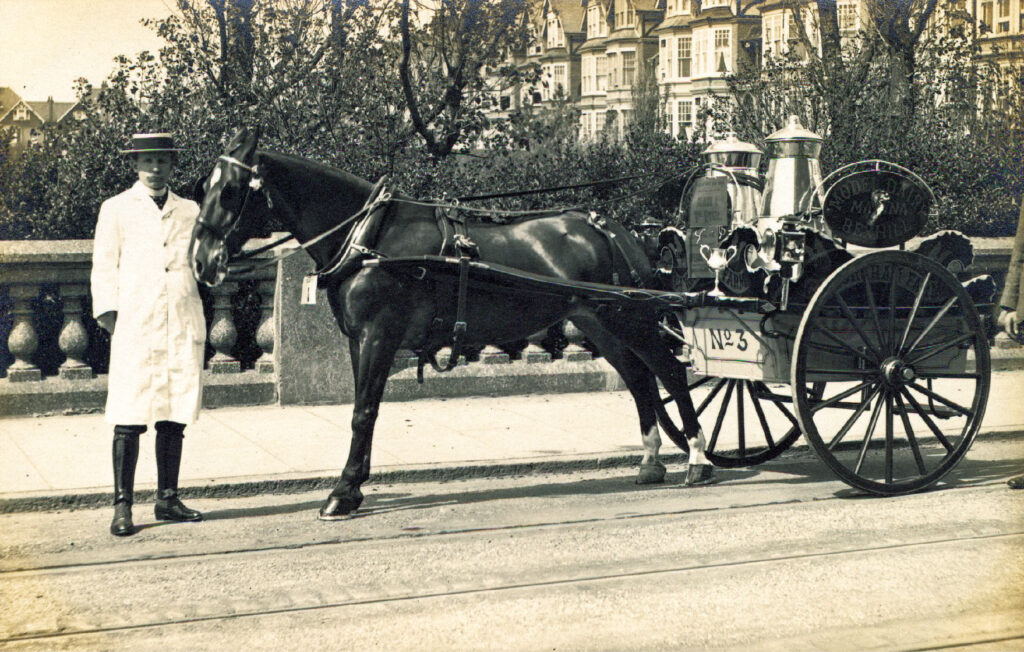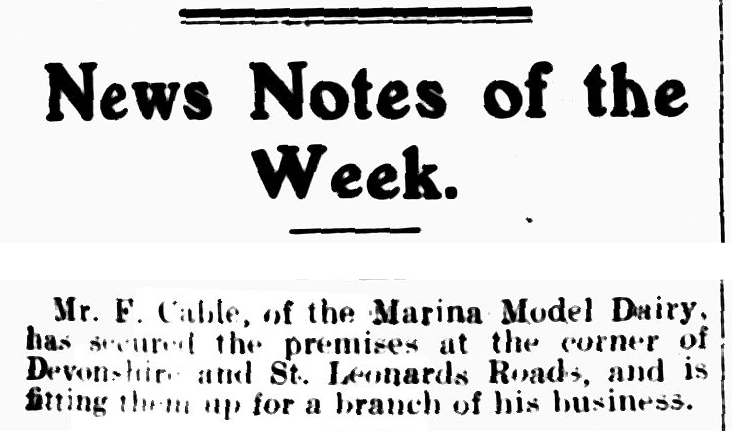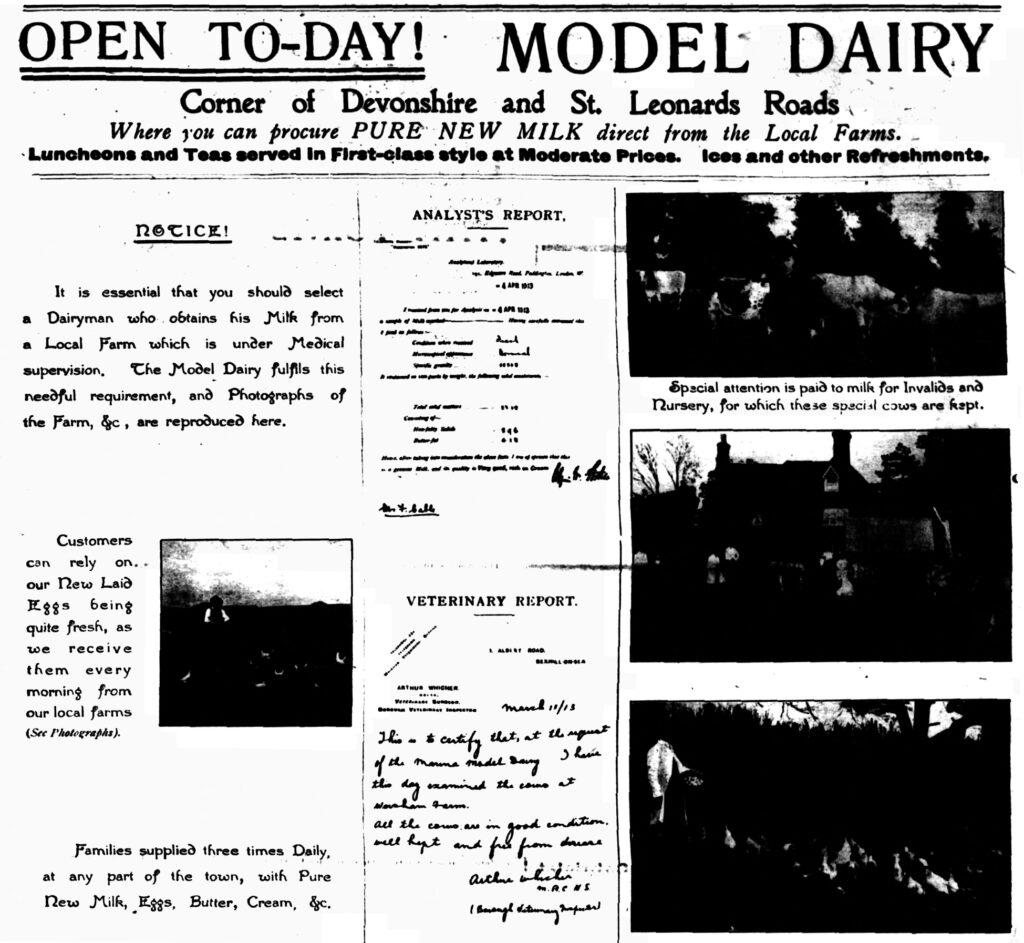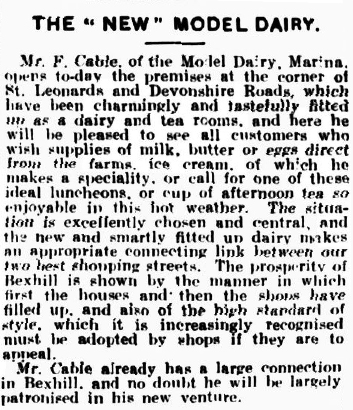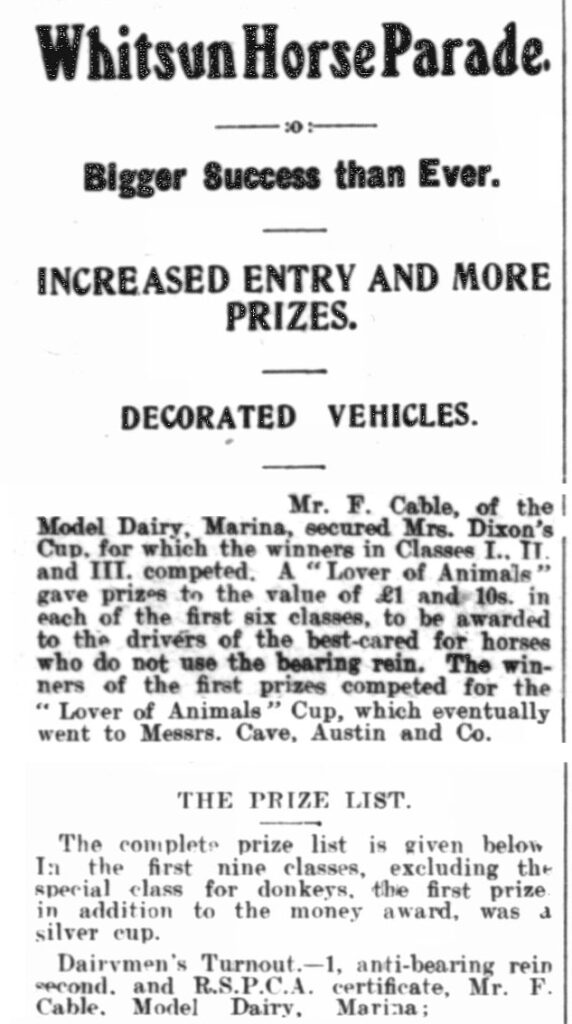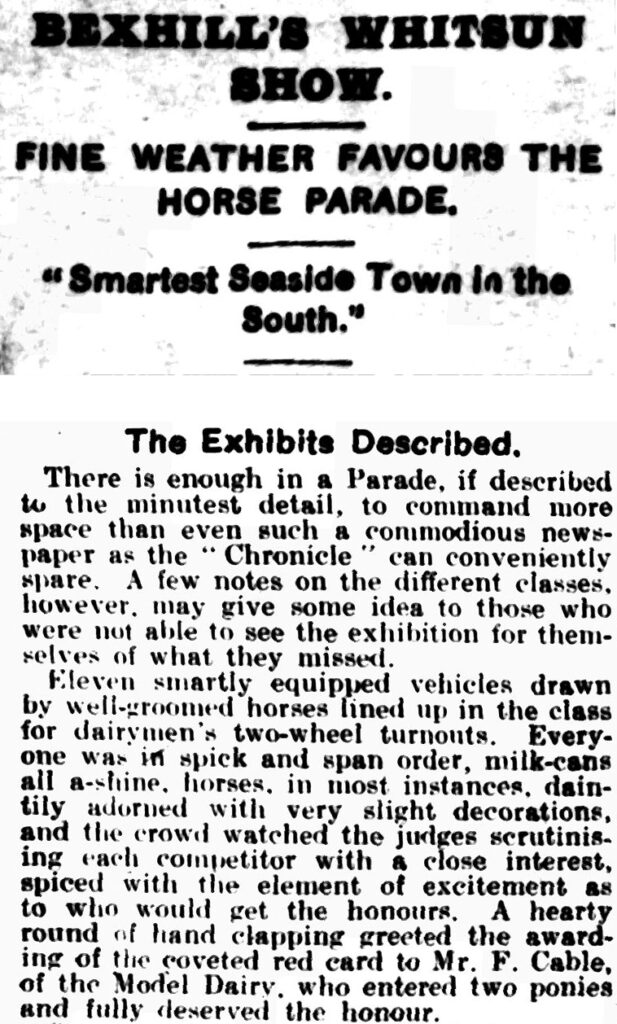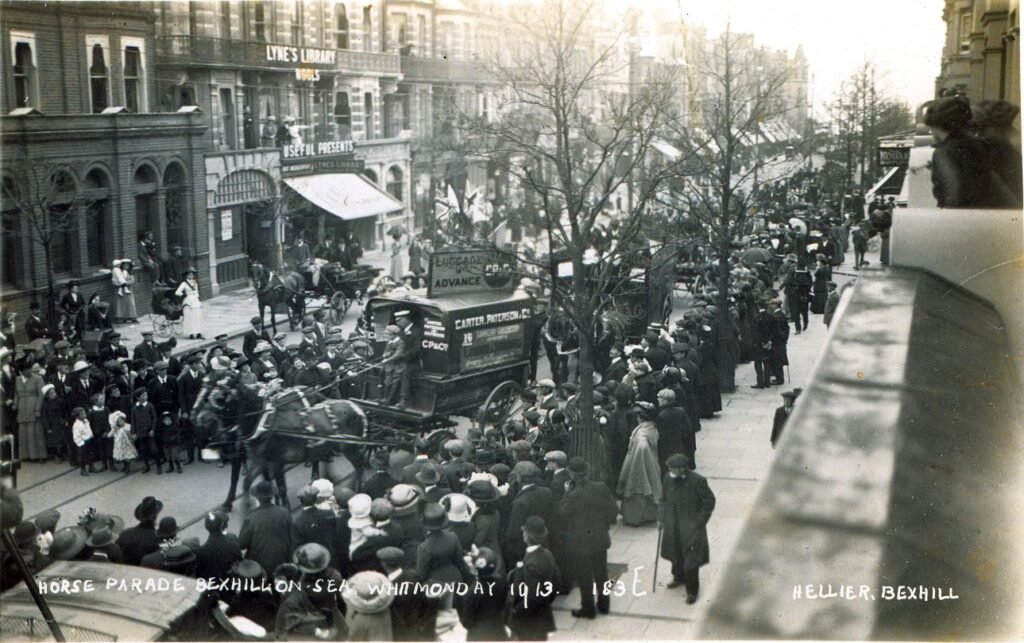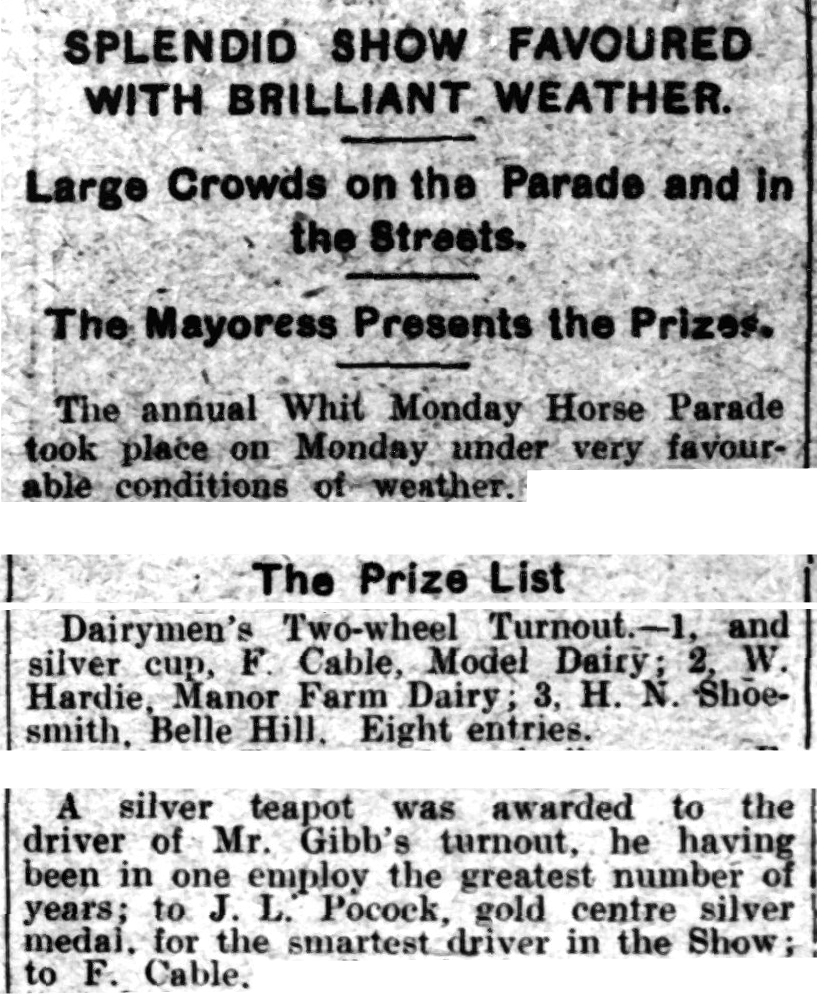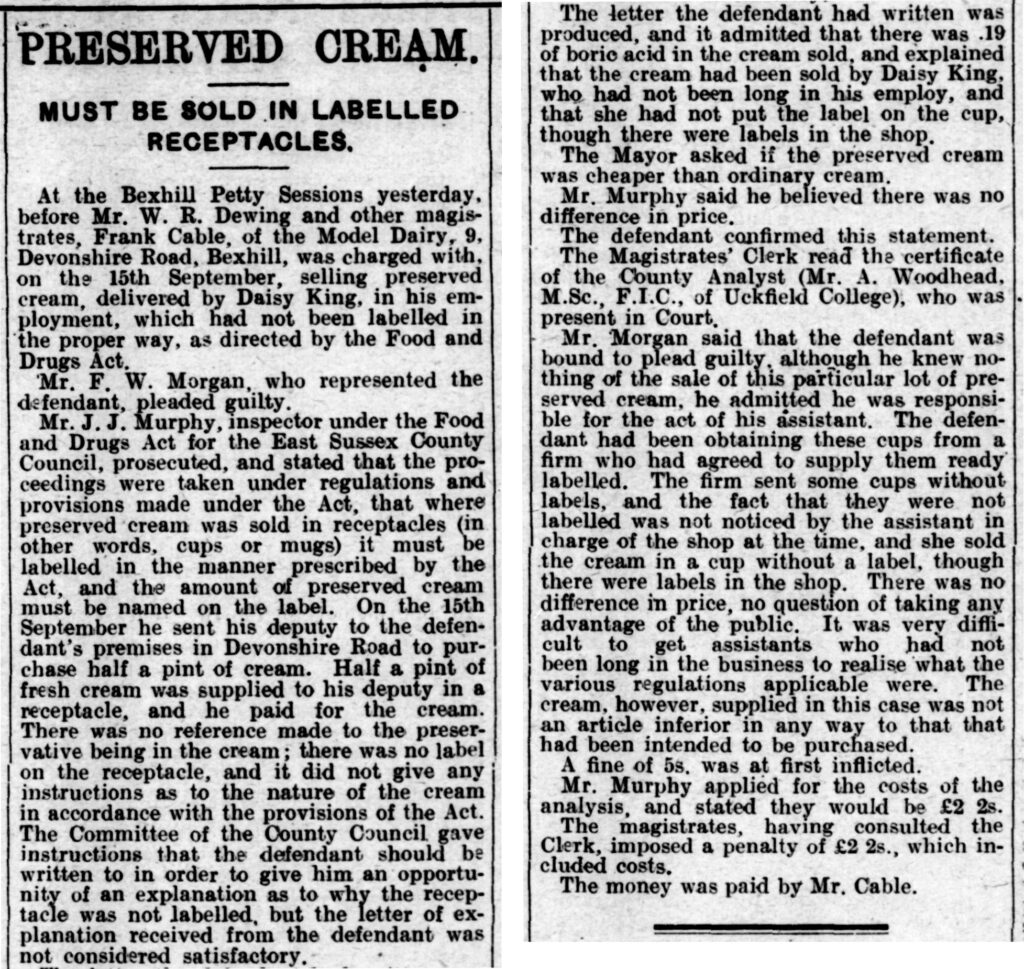CHAPTER IV
A Fire at the Dairy and a problem with unlabelled Cream
1912 – MARCH: A FIRE!
Ten months after Francis Harry Cable purchased the Model Dairy another article appeared in the local press, the Bexhill-on-sea Observer, this one dated Saturday 9th March 1912.
BEXHILL-ON-SEA OBSERVER, SATURDAY, MARCH 9, 1912.
FIRE AT A DAIRY.
MILK TO EXTINGUISH FLAMES.
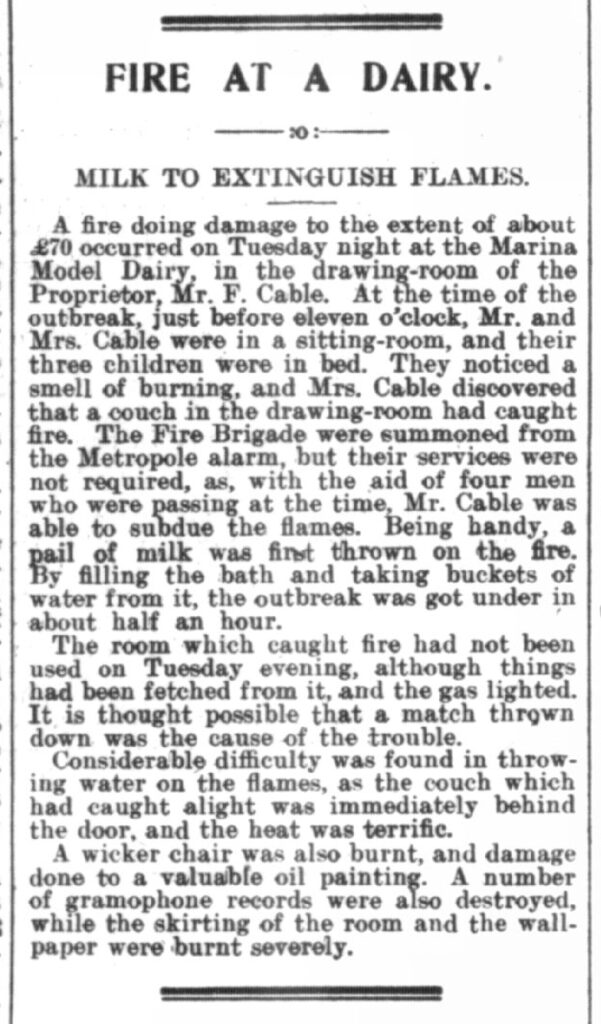 A fire doing damaged to the extent of about £70 occurred on Tuesday night at the Marina Model Dairy, in the drawing-room of the Proprietor, Mr. F. Cable. At the time of the outbreak, just before eleven o’clock, Mr. And Mrs. Cable were in a sitting-room, and their three children were in bed.
A fire doing damaged to the extent of about £70 occurred on Tuesday night at the Marina Model Dairy, in the drawing-room of the Proprietor, Mr. F. Cable. At the time of the outbreak, just before eleven o’clock, Mr. And Mrs. Cable were in a sitting-room, and their three children were in bed.
They noticed a smell of burning and Mrs. Cable discovered that a couch in the drawing-room had caught fire. The Fire Brigade were summoned from the Metropole alarm, but their services were not required, as, with the aid of four men who are passing at the time, Mr. Cable was able to subdue the flames. Being handy, a pail of milk was first thrown on the fire. By filling the bath and taking buckets of water from it, the outbreak was got under [control] in about half an hour.
The room which caught fire had not been used on Tuesday evening, although things had been fetched from it, and the gas lighted. It is thought possible that a match thrown down was the cause of the trouble.
Considerable difficulty was found in throwing water on the flames, as the couch which had caught alight was immediately behind the door, and the heat was terrific. A wicker chair was also burnt, and damage done to a valuable oil painting. A number of gramophone records were also destroyed, while the skirting of the room and the wallpaper were burnt severely.
Footnote: A report of this fire also featured in ‘The Bexhill Chronicle‘ on the same day, although this article above, in the Observer, was more comprehensive.
However, the Chronicle included additional information that a ‘tram conductor and driver, who happened to be on the spot’, assisted Frank Cable in extinguishing the fire, that the ‘drawing-room was badly burnt and charred’ and also ‘The fire rocket was exploded at 11:35, and thirteen of the fourteen firemen were at the fire station within five minutes awaiting orders, Captain F.G. Wise being in charge’.
1912 APRIL: UNNECESSARY SUFFERING TO A HORSE
The month following the fire at his home, Frank faced the County Magistrates to answer a charge of cruelty to the horse he used for delivering milk.
BEXHILL-ON-SEA OBSERVER, SATURDAY, APRIL 6, 1912.
UNFIT FOR WORK.
R.S.P.C.A. CASE AT BEXHILL.
DAIRYMAN FINED.
At Hastings, on Saturday, the County Magistrates, eleven in number, were engaged for well over an hour hearing a case brought by the R.S.P.C.A .against Frank Cable and John Ashton, owner and employee respectively, for unreasonably working a horse whilst in an unfit state, and thereby causing it unnecessary suffering, at Bexhill, on March 18th. Inspector Jones prosecuted, and the defence was undertaken by Mr. F. W. Morgan.
Both defendants pleaded not guilty.
P.C. Evans, called as the first witness, said that at 7.50 a.m. on March 18th he saw defendant Ashton near the Post Office, Little Common. He was leading a dark mare attached to a light trap loaded with milk cans. He noticed the horse was lame on its near fore leg, and on stopping and examining it, he found the foot was very hot.
He told the defendant to take it out and lead it home. Ashton said: “I have been expecting this for some time. It has been lame for about a week.” Later he went with defendant Cable to the stable at Bexhill. He found the mare lying down, and the shoe, a three-quarter one, taken off. The hoof had been cut back and exposed a corn. Witness asked Cable if he saw the mare go out that morning, and he replied: “Yes, I did. She was a bit lame then, but that usually works off.
He visited the stable next day, with Inspector Jones. The mare seemed worse.
Cross-examined by Mr. Morgan, witness said he saw nothing the matter with the horse except the corn. Mr. Cable told him that it had recently been shod, and the corn had then been attended to.
Mr. Morgan – Did he say the horse had been sent out that morning for exercise?
Witness – Yes, sir; he did.
You know a horse standing in a stable will get stiff? – Oh, yes.
Did he tell you the horse had been out the day before, on the Sunday? – He said he had been working it regularly on the Little Common round.
Did he say he had taken it out then, and it has gone all right? – I don’t remember him saying that.
Turning into the Bench, Mr. Morgan said that the case was about the mare’s usual round comprised Bexhill and Sidley and not merely Little Common, and that she had been sent out this day by way of exercise, and not for the purpose of work.
Further questioned, witness denied that Ashton said he had been expecting to be stopped because of a postman warned him up the hill.
Mr Morgan – did Mr. Cable say he thought the mare must have hit a stone on this particular morning? Witness – No, sir.
I put it to you that he said she was a bit stiff when she started?
Mr. Cable said she usually went stiff with this corn.
Inspector Jones next entered the box.
He said he examined the horse, an aged bay mare, at the stables on March 19th in the presence of both defendants.
He found it in good condition, but very lame on the near fore leg and suffering from a festered corn, extruding matter. It was in pain, and quite unfit to work.
He asked for an explanation, as he proposed reporting the matter to his Society, and Ashton said the horse has been lame for about three days. The master sent him out with it the morning previous, and he saw it was going lame.
Mr. Cable agreed that the mare was lame when it went out on the 18th, and said that it had been so for a few days.
As a rule, however, the lameness wore off. Defendant further stated that it only had a short round to do and added: “I hope you’ll make it as easy as you can for me, as business is not very bright at present”. On the 23rd the horse was examined by Mr. Jarvis, veterinary surgeon, of St. Leonards.
Mr. Morgan (cross-examining) – It comes to this, that the mare got worse in the stable than when she was out?
Witness – No doubt she did.
I suppose a certain amount of exercise is good for a horse with a corn? – Oh, yes.
Mr. T. Parking (one of the Magistrates) – Provided no pain is suffered at the time. Witness – That is so, sir.
Henry Jarvis spoke to the examining the mare at the Sackville Mews on the 23rd. It was suffering from a suppurating corn and, in his opinion, was certainly not in a fit state to take out. It could hardly walk.
By Mr. Morgan – He had no hesitation saying that he could bring the horse back to working condition.
This was all the evidence for the prosecution, and Mr. Morgan addressed the Bench. He said there was no doubt as to the fact the horse was suffering pain when it was stopped by the officer, and there was no doubt that it had been suffering from the corn for some days before.
The whole point of the case was whether the actions of the two defendants was wilful, and he hoped to be able to satisfy the Magistrates that this was not so. They might have condemned an error of judgement in sending the mare to Little Common, but he thought they would see, after hearing the defendants, that they had not done more than that.
The ordinary course of work for this horse, continued Mr. Morgan, was to go to and from Little Common in the mornings, and round Bexhill and Sidley in the afternoon.
In consequence of this corn it had taken off the Bexhill and Sidley round, the heavier of the two, and it was simply sent to from Little Common, with the honest idea that it needed exercise.
Mr. Cable supported this statement in the witness box, and said that he had served the Little Common round on a bicycle. He had, in fact done so since the horse had been laid up. He had had a farrier to see the horse on two occasions, the first three days before it was stopped, and the second after the Inspector had called.
Ashton also collaborated.
Following a short consultation, the Chairman (Admiral St. John Garforth) said that Mr. Cable would be fined 10s. and 10s. costs, and, on the application of Inspector Jones, a veterinary fee of 10s. 6d.was also allowed.
The case against Ashton was dismissed.
1912 – MAY: AN AWARD FOR FRANK
The Bexhill Horse Show prize giving is one of the oldest-established sporting events in that town, with a history dating back to 1903. The show is primarily equestrian includes showjumping, driving, showing classes and a dog show plus trade stands.
Frank Harry Cable entered a competition on Whit-Monday on 27th May 1912 in the “Lover of Animals” category, but I have no idea what they may have been, but it was a category in which he achieved first prize!
BEXHILL’S CUP DAY
SPLENDID EXHIBITION AT THE HORSE SHOW.
POPULAR HOLIDAY ATTRACTION.
Whit-Monday was Cup Day at Bexhill.
LIST OF AWARDS
Dairymen’s Two- wheel Turnout (nine entries). – 1 and silver cup, Mr. G. Shoesmith, Belle Hill; 2, Mr. W Hardie, Manor Farm Dairy; 3, Messrs Waite and Whybourne, High-street; v.h.c. and “Lover of Animals” first prize, Mr. F. Cable, Marina Model Dairy; “Lover of Animals” second prize, Messrs. Waite and Whybourne. Also entered: Mr. H. Shoesmith, Belle-hill.
The Bexhill Horse Show – 27th May 1912 which was attended by Frank Harry Cable
Click on the above to see a larger version of these images
1912 – THIS, I BELIEVE, IS FRANK HARRY CABLE!
This photograph shows a milk delivery cart belonging to the Marina Model Dairy, the name of the dairy can be seen on the oval board above the wheel at the back. It is believed to have been taken c.1912 and it is my belief, the gentleman holding the reins, is FRANK HARRY CABLE!
As mentioned, the photograph is c.1912, the year after Frank Cable took ownership of the Marina Model Dairy in May 1911. In May 1912 Frank Harry Cable, of the Marina Model Dairy, won 1st Prize in an event at the Bexhill Horse Show. At the front of the cart the words ‘1st Prize’ can be seen. I have also compared the gentleman with a picture known to be of Frank Harry Cable, a copy of which I am seeking to obtain, and I’m pretty sure it is of the same person.
Additionally, as Frank Harry Cable was the owner of the Marina Model Dairy why wouldn’t it be him in this photograph? Why would he want someone else to take the spotlight? I’m reasonably sure the person in this photograph is Frank Harry Cable.
A milk delivery cart belonging to the Marina Model Dairy, together with, most probably, Frank Harry Cable. c.1912
A milk delivery cart belonging to the Marina Model Dairy, together with, most probably, Frank Harry Cable. c.1912
Click on the photograph to see a larger view.
Image Credit: Bexhill Museum
1913 FEBRUARY: FRANK GETS ADDITIONAL PREMISES
Frank Cable is reported to have acquired a property in Devonshire Road, Bexhill to give his business a facility in one of the major streets in Bexhill.
The Chronicle, Saturday, February 15, 1913
News Notes of the Week
Mr. F. Cable, of the Marina Model Dairy, has secured the premises at the corner of Devonshire and St. Leonards Roads, and is fitting them up for a branch of his business.
DEVONSHIRE ROAD BEXHILL
On the map below right, the location of Model Dairy, 9, Devonshire Road, Bexhill is marked with a red circle. It is on the corner of Devonshire Road and St. Leonards Road. The building, as it would have been in Frank Harry Cable‘s time, no longer remains. The photograph on the right, which is contemporary with the time Frank was owner of the dairy, is behind the tram and is also marked with a red circle. (Click on the images to see a larger view)
Devonshire Road, Bexhill. The location of Frank Cable’s Model Dairy.
Click on the pictures to enlarge
1913 MAY: THE NEW PREMISES IS OPEN!
It appears Frank Cable ensured he had local publicity to fully promote the opening of his new premise on Devonshire Road. The first section is likely a paid advertisement taken out by Frank, but unfortunately the photographs cannot be in the advertisement cannot be seen. The second section is a news report of the opening of the dairy in the same newspaper.
THE CHRONICLE, SATURDAY, MAY 31, 1913
OPEN TO-DAY! MODEL DAIRY
Corner of Devonshire and St. Leonards Roads.
Where you can procure PURE NEW MILK direct from the Local Farms. Luncheon and Teas served in First-class style at Moderate Prices. Ices and other Refreshments.
Notice
It is essential that you should select a Dairyman who obtained his Milk from a Local Farm which is under Medical supervision. The Model Dairy fulfils this needful requirement, and Photographs of the Farm, &c, are produced here. Customers can rely on our New Laid Eggs being quite fresh, as we receive them every morning from our local forms. Families supplied three times Daily, at any part of town, with Pure New Milk, Eggs, Butter, Cream, &c.
Veterinary Report
This is to certify that, at the request of the Marina Model Dairy I have this day examined the cows at Worsham Farm. All the cows are in good condition, well kept and free from disease. Special attention is paid to Invalids and Nursery, for which these special cows are kept.
THE “NEW” MODEL DAIRY
Mr. F. Cable, of the Model Dairy, Marina, opens to-day the premises at the corner of St. Leonards and Devonshire Roads, which has been charmingly and tastefully fitted out as a dairy and tea rooms, and here he will be pleased to see all customers who wish supplies of milk, butter, or eggs direct from the farms, ice cream, of which he makes a speciality, or call for one of these ideal luncheons, or cup of afternoon tea so enjoyable in this hot weather.
The situation is excellently chosen and central, and the new and smartly fitted up dairy makes an appropriate connecting link between our two best shopping streets.
The prosperity of Bexhill is shown by the manner in which first the houses and then the shops have filled up, and also of the high standard of style, which is increasingly recognised must be adopted by shops if they are to appeal.
Mr. Cable has already a large connection in Bexhill, and no doubt will be largely patronised in his new venture.
1913 – MAY: AN AWARD FOR FRANK
Following his success in 1912, Frank Harry Cable again entered the competition at the Whitsun Horse Parade and was successful in gaining first prize in his entered category.
Whitsun Horse Parade
Bigger success than ever.
INCREASED ENTRY AND MORE PRIZES.
DECORATED VEHICLES.
Mr. F. Cable, of the Model Dairy, Marina, secured Mrs. Dixon’s Cup, for which the winners in Classes I., II. and III. competed.
A “Lover of Animals” gave prizes to the value of £1 and 10s. in each of the first six classes, to be awarded to the drivers the best-cared for horses who do not use the bearing rain.
The winners of the first prizes competed for the “Lover of Animals” Cup, which eventually went to Messrs. Cave, Austin and Co.
THE PRIZE LIST
The complete prize list is given below. In the first nine classes, excluding the special class for donkeys, the first prize in addition to the money award, was a silver club.
Dairyman’s Turnout. – 1, anti-bearing rein second, and R.S.P.C.A. certificate, Mr. F. Cable, Model Dairy, Marina;
Footnote: Bearing rein / Anti-bearing rein – An explanation
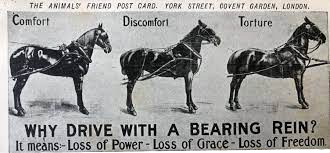 A ‘bearing rein’, also known as a ‘check rein’, forces a horse’s head into an unnaturally high position. Its sole purpose was to improve the bearing (deportment) of a carriage horse. A horse naturally lowers its head and stretches its neck when pulling a load, horses wearing a bearing rein cannot easily pull a load.
A ‘bearing rein’, also known as a ‘check rein’, forces a horse’s head into an unnaturally high position. Its sole purpose was to improve the bearing (deportment) of a carriage horse. A horse naturally lowers its head and stretches its neck when pulling a load, horses wearing a bearing rein cannot easily pull a load.
An ‘anti-bearing rein’, mentioned in Frank’s award, is a device used in a horse’s tack to prevent or counter the use of a bearing rein. An ‘Anti-Bearing-Rein Association’ was an organization founded in England in the 19th century to advocate against the use of bearing reins, due to concerns over animal cruelty and the physical harm it caused to horses, such as affecting their airways and ligaments. Anna Sewell’s novel Black Beauty, published in 1877 was a significant cultural force in the anti-bearing rein movement, making a powerful case against the practice.
The word ‘second’ also mentioned in Frank’s award could refer to the “second” or “second generation” of anti-bearing rein advocacy, post-dating the initial outcry and the banning of bearing reins in the early 20th century.
DETAILS OF THE HORSE PARADE
The Bexhill Chronicle included comprehensive details of the parade, a small section of which is below, featuring Frank Cable’s contribution to the parade.
BEXHILL’S WHITSUN SHOW.
FINE WEATHER FAVOURS THE HORSE PARADE.
“Smartest Seaside Town in the South.”
The Exhibits Described.
There is enough in a Parade, if described to the minutest detail, to command more space than even such a commodious newspaper as the “Chronicle” can conveniently spare.
A few notes on the different classes, however, may give some idea to those who were not able to see the exhibition for themselves of what they missed.
Eleven smartly equipped vehicles drawn by well-groomed horses lined up in the class for dairyman’s two-wheel turnouts.
Everyone was in spick and span order, milk cans all a-shine, horses, in most instances, daintily adorned with very slight decorations, and the crowd watched the judges scrutinising each competitor with a close interest, spiced with the element of excitement as to who would get the honours.
A hearty round of hand clapping greeted the awarding of the coveted red card to Mr. F. Cable, of the Model Dairy, who entered two ponies and fully deserved the honour.
An excellent picture of the 1913 Whitsun parade, in which Frank Harry Cable took part and won an award, is shown below.
The Horse Parade at The Bexhill Horse Show – Whit Monday 1913
Click on the above to see a larger version of this image
Photograph reproduced with the permission of the Bexhill Museum
1914 – MAY: FRANK WINS AGAIN!
For the third consecutive year Frank Harry Cable enters the competition at the annual Whitsun Bexhill Horse Parade, and as in the previous two years, he is awarded first prize in his category, and on this occasion, an additional prize, a gold centre silver medal, for being the ‘smartest driver in the Show’.
THE CHRONICLE, SATURDAY, JUNE 6, 1914
SPLENDID SHOW FAVOURED WITH THE WEATHER.
Large Crowds on the Parade and in the Streets.
The Mayoress Presents the Prizes.
The annual Whit Monday Horse Parade took place on Monday under very favourable conditions of weather.
The Prize List
Dairyman’s Two-wheel Turnout. – 1, and silver cup, F. Cable, Model Dairy; 2, W. Hardie, Manor Farm Dairy; 3, H.N. Schmitt, Belle Hill. Eight entries.
A silver teapot was awarded to the driver of Mr. Gibbs turnout, he having been in one employ the greatest number of years; to J.L. Pocock, gold centre silver medal, for the smartest driver in the Show; to Mr. F. Cable.
Footnote: This 1914 Bexhill Horse Parade was to be the last to be held in its traditional format, as later that year, on August 4th, 1914, Britain declared war on Germany, after Germany failed to remove its troops from the neutral territory of Belgium. The Great War, as it was then known, continued until 1918.
After the war, at a meeting in June 1920, it was reported in the Bexhill-on-Sea Observer that, largely to the great increase in motor transport, it was thought there would be no prospect of a horse parade in the imminent future. Consequently, it was decided to give any money remaining to the local War orphans.
However, in May 1923, the Bexhill-on-Sea Observer reported there was a horse and vehicle parade in that year although it was “but a shadow of what the old Whit Monday horse show used to be before the war”.
1915 – NOVEMBER: FRANK APPEARS BEFORE MAGISTRATES
As reported in a local paper ‘The Chronicle’, Frank Harry Cable appears before the magistrates at Bexhill Petty Sessions facing a relatively minor charge. At this time Frank is 34 year old and has owned the dairy for over four years.
PRESERVED CREAM.
MUST BE SOLD IN LABELLED RECEPTACLES.
At the Bexhill Petty Sessions yesterday [Editor’s note:12th Nov 1915), before Mr. W.R. Dewing and other magistrates, Frank Cable, of the Model Dairy, 9, Devonshire Road, Bexhill, was charged with, on the 15th September [Editor’s note:1915], selling preserved cream, delivered by Daisy King, in his employment, which had not been labelled, in the proper way, as directed by the Food and Drugs Act.
Mr. F.W. Morgan, who represented the defendant, pleaded guilty.
Mr. J.J. Murray, inspector under the Food and Drugs Act for the East Sussex County Council, prosecuted, and stated that the proceedings were taken under the regulations and provisions made under the Act, that where preserved cream was sold in receptacles (in other words, cups or mugs) it must be labelled in a manner prescribed by the Act, and the amount of preserved cream must be named on the label. On the 15th September he sent his deputy to the defendant’s premises on Devonshire Road to purchase half a pint of cream. Half a pint of fresh cream was supplied to his deputy in a receptacle, and he paid for the cream. There was no reference made to the preservative being in the cream; there was no label on the receptacle, and it did not give any instructions as to the nature of the cream in accordance with the provisions of the Act.
The Committee of the County Council gave instructions that the defendant should be written to in order to give him the opportunity of an explanation as to why the receptacle was not labelled, but the letter of explanation received from the defendant was not considered satisfactory. The letter the defendant had written was produced, and it admitted that there was .19 of boric acid in the cream sold, and explained that the cream had been sold by Daisy King, who had not been long in his employ, and that she had not put the label on the cup, though they were labels in the shop. The Mayor asked if the preserved cream was cheaper than ordinary cream. Mr. Murphy said he believed there was no difference in price. The defendant confirmed this statement.
The Magistrates’ Clark read the certificate of the County Analyst (Mr. A . Woodhead, M.Sc., F.I.C., of Uckfield College), who was present in Court. Mr. Morgan said that defendant was bound to plead guilty, although he knew nothing of the sale of this particular lot of preserved cream, he admitted he was responsible for the act of his assistant. The defendant had been obtaining these cups from a firm who had already agreed to supply them ready labelled. The firm sent some cups without labels, and the fact that they were not labelled was not noticed by the assistant in charge of the shop at the time, and she sold the cream in a cup without a label, though there were labels in the shop. There was no difference in price, no question of taking any advantage of the public. It was very difficult to get assistants who had not been long in the business to realise what the various regulations applicable were. The cream, however, supplied in this case was not an article inferior in any way to that that was been intended to be purchased.
A fine of 5s. was at first inflicted. Mr. Murphy applied for the costs of the analysis, as stated that it would be £2 2s. The magistrates, having consulted the Clerk, imposed a penalty of £2 2s, which included cost. The money was paid by Mr. Cable.
FOOTNOTE: It is highly probable that the aforementioned ‘Daisy King’, the newly employed assistant, who was responsible for this ‘offence’ on 15th September, was the successful applicant to an advertisement that appeared, around four weeks earlier, in the ‘Sussex Express, Surrey Standard and Kent Mail’ on Friday 13th August, 1915.
YOUNG LADY wanted to assist in shop – Apply, personally, F. Cable, Model Dairy, Marina. a21b
Next Page: Further appearances before the Magistrates
